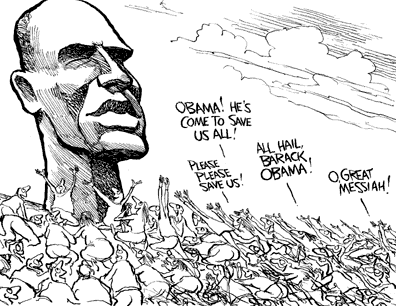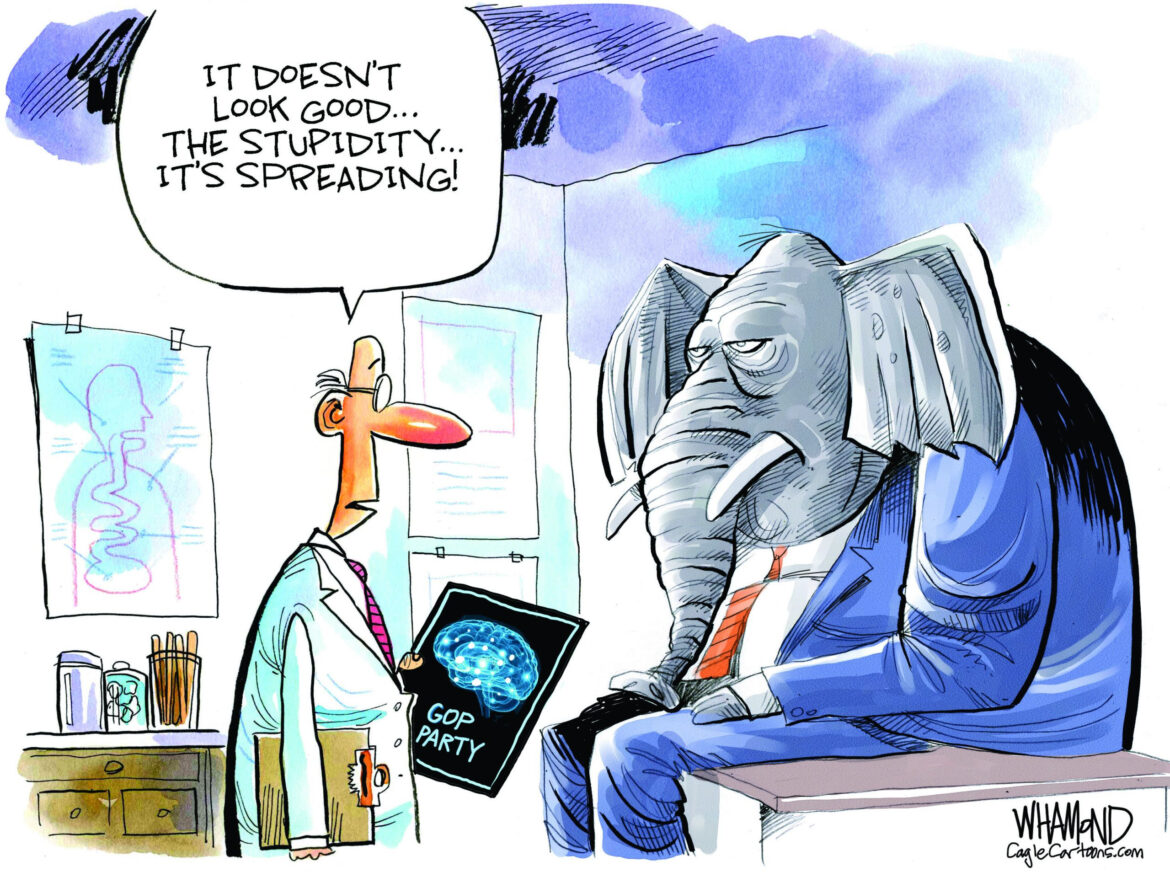An outspoken columnist named Samuel Francis got himself fired from the Washington Times in the 1990s for voicing views on slavery, Christianity and Bolshevism that his editor considered intolerably radical. I mention him here, not in the context of those remarks but by way of recalling his oft-repeated moniker for the Republican Party. Francis called the GOP “The Stupid Party” because of Republicans’ tendency to do (and say) things that cost them elections they should have won. I revive his term because of the behavior of some GOP candidates and voters during the 16-year Obama-Trump-Biden era.
In 2012, two good Republican candidates for the U. S. Senate destroyed their election prospects by getting into stupid discussions about “rape” in front of reporters. There was simply no way to emerge from that in the contemporary media climate without being damaged. There are no jokes or off-hand comments in politics.
On the voter side, I have seen reports that Governor Romney got 2 million fewer votes in 2012 than Senator John McCain received in 2008. If so, it means that a goodly segment of the GOP electorate basically threw the election by not showing up.
Whatever Democrat voters’ failings might be, you have to say that party-disloyalty is not one of them. Despite a riotously failed first term, gigantic federal deficits, a truly awful economic “recovery,” an overturned racial climate, and a chaotic foreign policy, Mr. Obama’s acolytes hung with him through thick and thin – mostly the latter – in 2012.
With the addition of those missing 2 million voters – plus many others who should have been thronging the polls to support him – Mr. Romney could have carried enough states to win the election. Surely he had a right to expect at least the same level of support that Mr. McCain received. But he didn’t get it. Why not is where we really enter the dark underworld of the Stupid Party. It’s worth a look at several aspects of that election campaign:
- Not My Guy. Republican voters have a history of sitting on their hands when their party’s nominee for the presidency turns out not to be the candidate they prefer. Today’s primary system of choosing a candidate almost guarantees that outcome. When several candidates are running, many of the party’s voters will find their favorite guy (or gal) eliminated at some point in the race. This very thing happened in 2012, as the original field of seven candidates gradually got winnowed down to Mr. Romney, following a particularly sharp and divisive primary campaign in which a lot of mud was flung. Analysts then theorized that Mr. Romney might have been so crippled by the wounds inflicted on him by the other Republican candidates that he wouldn’t be able to win the general election. Essentially, that prediction was accurate.
- Scary Tall Tales. Then came Mr. Romney’s general election campaign against Barack Hussein Obama, who was running for the second term that he earlier had said he wouldn’t seek if the economy wasn’t fixed. (Evidently that promise slipped his mind in 2012.) He had no positive record to run on, so his entire campaign strategy involved smearing Mr. Romney and scaring voters with exaggeration, disinformation, and outright lies. (Does that sound familiar?) His shtick brought his base out to the polls – not like his vote-totals of 2008 when he was the emergent messiah, but just enough to get him beyond 270 electoral votes.
- Non-voters. Running on an economy this poor, President Obama should have been routed by a strong GOP vote for Governor Romney. That vote didn’t materialize, however, despite the fervent hopes of GOP partisans that a silent army of Republican voters was waiting, under the radar, ready to flood the polls. But it was a vain hope. Mr. Romney went down to a rather narrow defeat in an election that should have been as near to a sure thing as one can find in politics.
- Fumblers. So, was Mr. Obama simply the greatest political genius of his generation? Are Republicans snake-bitten? Or are they just hopelessly fumble-fingered about staying together enough to win critical elections that are hanging there like ripe fruit, waiting to be plucked.

- The Biggest Mess. Mr. Obama was undoubtedly a smart, nimble politician. He masterfully repeated (and repeated and repeated!) the charge that George W. Bush left the worst mess in the history of the world. Bill Clinton seconded the motion, saying that even he couldn’t have fixed it in four years. (Well, that settled it!) The One said he needed more time because he hadn’t realized how bad things really were when he took over. He blamed Mr. Bush’s low taxes for the bank crash of 2008 and the economic contraction that followed. And he accused Republicans of blocking his righteous attempts to make “the rich” pay their “fair share.” He delicately failed to mention, though, that during two full years of Democrat majorities in both Congressional houses he could have obtained any legislation he desired. Yet he mysteriously failed to do so. (Was that G. W. Bush’s fault, too?)
- Non-rebuttal. This carload of tall tales provoked barely a peep from Republicans and Mr. Romney to correct the record. And what they did say made little impression. Exit polls confirmed that significant numbers of Mr. Obama’s voters still believed that the crashed economy was mostly Mr. Bush’s fault.
- History Repeated. This lack of correction recalls Democrats’ enduring tale that FDR ended the Great Depression caused by Herbert Hoover. Well into the late 1950s this was still the conventional wisdom. But now, ninety years on, historians largely agree that while Hoover’s policies deepened the post-crash recession, it was Roosevelt’s socialist spending, taxing and regulations that kept unemployment near to 20% all through the 1930s. Preparations for war finally produced a real recovery around 1940.
In 1992, a virtually unknown Arkansas governor named Bill Clinton rode a post-war downturn and a tale about the “worst economy since the Great Depression” to an unexpected win over George H. W. Bush. President Bush didn’t bother to dispute the “worst economy” story. He evidently didn’t realize that significant numbers of voters – who wouldn’t have known the Great Depression from the Great Gatsby – would swallow this whopper. Failing to educate them was a core reason for his defeat.
Mr. Bush later admitted that he considered the worst-economy claim too silly to answer. If that election taught us anything, it was that no claim, charge or accusation, in a political context, should ever be considered “too silly” to answer. And the derivative lesson is that one should never assume that voters are educated about something as complicated as the economy, or as remote as history.
Later, Mr. Romney lost because he failed to grasp these important lessons, learned at such dear cost by Mr. Bush. He evidently thought most voters shared his level of understanding about taxes, spending, and how a free-market economy works. Clearly, they did not, but Mr. Romney made little effort to help voters understand these matters.
The “history thing” (as President Bush-41 might have called it) was a related factor in Mr. Romney’s failed campaign. He didn’t educate voters sufficiently on what caused (and prolonged) the Great Depression, or on what really caused the bank crashes and economic contraction of 2008. Younger voters understand little about any of those topics. This is why they accepted Mr. Obama’s tall tales so readily. If Mr. Romney thought the public schools were educating students about these historic and economic matters, he was sadly mistaken.
The 2012 campaign evoked a vignette from the Foyle’s War dramatic series, seen on PBS-TV. Mr. Foyle was a Police Chief Inspector in WWII England who solved crimes often related to the war. On one occasion, he was discussing the German character with an army officer who interrogated German soldiers and airmen who had been captured. The officer believed that “kindness” was the best approach. Mr. Foyle didn’t exactly disagree, but he had a wider point of view. As proof he related his experience before the war, when he traveled to Germany with a police soccer team for a match against a German team.
Mr. Foyle recalled how the Germans had wined and dined them – singing, quaffing copious steins of beer, and finally getting to bed around dawn. A few hours later they staggered onto the pitch, badly hung-over, where they met eleven entirely different men who hadn’t touched a drop and were in bed by 10 PM. “We got a complete stuffing,” said Mr. Foyle. He said the Germans are friendly folk, but they play by a different set of rules. “We’d better find out what game they’re playing, or we’re going to lose this war,” he added, “and it certainly isn’t cricket.”
That advice also applies to politics. Mr. Romney was a capable man who probably would have made a good president. But I don’t think he realized that the Democrats were playing by a different set of rules than he was – certainly not by the Marquis of Queensbury rules for gentlemanly combat. Republicans need to learn what those rules are, or they won’t win another election any time soon.
The issue of party loyalty – often entangled with ignorance, misplaced trust, and outright stupidity – arises in the GOP during each election season. In 2016, some Republican leaders opposed Donald Trump’s campaign for the presidency because he was “too rude and too crude” – not their usual polite, country-club candidate. They made a lot of noise about it, but millions of voters – including many who didn’t usually vote – thought differently. They chose The Donald because he looked (and sounded) like he might actually do something to get us out of the “transformational” hole Mr. Obama had dug for us.
Mr. Trump’s voters were “disloyal” to Republican Party leaders, but loyal to the country, when they elected a guy who looked tough enough to survive in the Washington Swamp. To repay that rebellion, GOP leaders stood aside while Hillary-led Democrats threw the kitchen sink at Mr. Trump and did their worst to block his America-first agenda. They couldn’t stop him from doing a lot of good for the nation. But they raised enough hell, and garnered enough mail-in ballots, to let Basement Joe Biden slip into the Oval Office by posing as the “normalizer” who would calm things down and “unite” the nation. (We should laugh at the “uniter” claim, but it’s really not funny.)
Now, here we are again – facing an election which Republicans should certainly win, if voters show the same intelligence, independence, and rebellious spirit they exhibited in 2016. As we approach November, we’ll have to listen to more scary tales about what the evil Trumpster will supposedly try to do, as he becomes a dictator, “destroys democracy,” takes revenge on his enemies, and wrecks the country.
If voters buy that heap of manure, they’ll turn the party that freed the slaves into the Stupid Party once again. But if we can recognize that these “bad Trump” tales are just refashioned lies that Democrats always spin at election-time, we’ll have a shot at obtaining the prosperity, security and sound governance Mr. Trump wants to give us. There’ll be some rough seas ahead, but with Providential help and sensible thinking we’ll weather the storms.
For voters, the “sensible” part is understanding that politics is “the art of the possible.” You get to vote, but you lose your voice if you don’t vote for one of the two main candidates. (Alabamans call it choosing “the lesser of two weevils.”) Lately some voters are saying they’ll vote for Joe Schmoh, or some other unknown pol, because they dislike both Biden and Trump. But only Republicans seem to let style determine their votes. In response I would implore anyone leaning in this direction to vote for the candidate who offers policies that will help the country and its people. Surely this can’t be Mr. Biden.
Ronald Reagan and others liked to remind us that “the Constitution is not a suicide pact.” This means we don’t have to stand idly by and salute as our Ship of State goes down, just because some party bigshots don’t like the cut of our captain’s jib.
In another time, as his nation faced great danger, Winston Churchill spoke these words to his countrymen:
“Hitler knows that he will have to break us in this island or lose the war. If we can stand up to him, all Europe may be freed and the life of the world may move forward into broad, sunlit uplands. But if we fail, then the whole world, including the United States, including all that we have known and cared for, will sink into the abyss of a new Dark Age… Let us therefore brace ourselves to our duties, and so bear ourselves that, if the British Empire and its Commonwealth last for a thousand years, men will still say, “This was their finest hour.“
Amen to that. Courage!



5 comments
Great analysis. Lots of truths here. In addition, we dont think strategically and the Dems play by their own rules. This year, however, the Democrats are split over the Gaza war. It will soon play out on the streets of Chicago and inside the Dem convention going on there. The flirtation with Democrat Socialism a la Obama and Bernie Sanders has been ruinous for the nation and hopefully, it will bite the Dems on the butt. So if Republicans were smart, theyd help get Jill stein the Green Party candidate on the ballot. And also Kevin McCarthy should put his PAC’s millions into defeating Democrats, not fellow Republicans for revenge reasons. Lots of food for thought here. Woody should send this to the RNC and Trump campaign
Romney was perceived as little more than a GOP elitist who had more of a connection with the democrat ideas than with actual Republican ideas. He was a bad choice among a string of bad choices that led to defeat when the road to success was obvious. Now, with his announcement that he won’t support the gop candidate for president we clearly see his true RINO+ nature. We need to get away from these kind of antiRepublican candidates at all levels.
The issue of what I call polarization, and a lack of ability to even look at, let alone see the big picture has been on my mind for decades. There is no such thing as 100% pure in politics. In selecting and supporting candidates, we compromise something every time we make a decision. IF we are unwilling to accept less than 100% of what we individually want, in a candidate, then we will have few wins. There are conceptual discussions, and then “nice to have” & “need to have” results. We should get out of that polarization type ignorance and learn how to coalesce around the need to have results.
We don’t marry these people for life, we hire them to do a job for a specified time. If they succeed, we rehire them. If they screw up, and don’t stick with what we hired them to do, we fire them and select another. Candidates should be assured of our point of view on this before they run.
I think most of the GOP base knows that you aren’t going to get 100%, but when you are offering to throw away your advantage and settle for 25% that is failure. Bush 1, McCain and Romney never understood the interests of the GOP base even though they were handed the Reagan success model on a silver plate. Trump is the only President that understood the Reagan model and now we are seeing many potential Republican contenders understand the winning formula – hopefully not too late.
I think most of the GOP base knows that you aren’t going to get 100%, but when you are offering to throw away your advantage and settle for 25% that is failure. Bush 1, McCain and Romney never understood the interests of the GOP base even though they were handed the Reagan success model on a silver plate. Trump is the only President that understood the Reagan model and now we are seeing many potential Republican contenders understand the winning formula – hopefully not too late. Our communist enemies, modern progressive democrats, have no qualms about seizing power by any means.